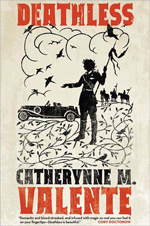

Tor Books, hardcover, 9780765326300
In the nineteenth and early twentieth centuries, many classical music composers, especially from Eastern European countries, incorporated the folk tunes of their native countries into their symphonies—in fact, some of these composers, such as Leoš Janáek, spent a great deal of time collecting and annotating folk tunes.
To someone like me who lacks the cultural heritage that produced these folk tunes, listening to such symphonies is a curious and not entirely satisfying experience. One ear is tuned to a classical symphony—the other is waiting for the next folk tune to pop into view. "Is that a folk tune … no, wait … ah, there it is! What a lovely melody!"
I found reading Catherynne M. Valente's Deathless to be like listening to one of these symphonies. The 'Deathless" of the title is Koschei the Deathless of Russian folklore, and the narrative of the novel fuses twentieth century Russian history, centering on the Siege of Leningrad, with Russian folktales about Koschei, Baba Yaga, and Marya Morevna. (This is the same folklore that underpins Ekaterina Sedia's novel The Secret History of Moscow, which I also reviewed for Belletrista.)
Many reviewers have praised Deathless highly, and I can see why. The novel is full of beautiful writing, striking images, and brilliant descriptive prose. Marya Morevna is well realised as a tragic heroine, and Koschei reimagined as a tragic hero. Quotations from Anna Akhmatova's poems preface each part of the novel. The fairytale elements, when they do emerge from the narrative, with their rules of three and Marya as the inconvenient fourth, work well as fairytales.
But the integration between the fairytale and the realistic elements of the narrative failed to convince me. The privations of the post-Revolution New Economic Policy period, during which Marya grows up, and the immense hardships and terrible loss of life endured by the residents of Leningrad during the siege of the city in World War Two—a siege which lasted over two years and cost far more civilian lives than the bombings of Hiroshima and Nagasaki combined—are weighty and tragic historical matters that didn't sit well with me as the backdrop to a lush and romantic fairytale.
Writing this, I'm aware that I sound like some dreadful Soviet literary functionary from the era of socialist realism, complaining about petit-bourgeois tendencies in literature. So let me phrase the same criticism another way. My favourite part of this novel is a short interlude set in a timeless and deathless village called Yaichka, inhabited by people known only by their given names and patronymics, with their surnames remaining politely unmentioned. There live not only Marya Morevna and Koschei Bessmertny, but also Vladimir Ilyich (Lenin) with his two sons Leon (Trotsky) and Josef (Stalin), and even Tsar Nicholas II, Tsarina Alexandra, and that disreputable and magical monk, Grigory Rasputin.
In these scenes, the real and fairytale histories of Soviet Russia are brought together brilliantly, mediated by irony as these butchers on grand and lesser scales play in the forest like innocent children, the ghosts of their real and terrible conflicts poking through the surface narrative as minor spats that are all resolved by dinnertime. Then Yaichka is left behind, the grand, operatic narrative resumes, and the coherence is lost.
When I reviewed The Secret History of Moscow, I said that I found the scenes set in 1990s Moscow more convincing
than the scenes set in the fairytale world under the city. For me, Deathless has the opposite problem: Fairyland
is vividly real, but the “real world” is shadowy by comparison. Deathless is a flawed symphony, but my goodness, it
contains some wonderful tunes.
